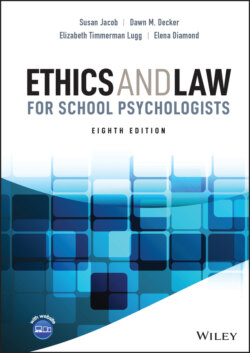Читать книгу Ethics and Law for School Psychologists - Susan Jacob - Страница 33
Case 1.1
ОглавлениеSamantha’s first- and second-grade teachers observed that she experienced difficulties with concentration and memory. She frequently failed to remember letter sounds and math facts she had previously mastered. Now, in third grade, Samantha continues to perform well below grade level even after multiple individualized interventions were attempted in the classroom. Samantha’s mother, Joanne, agrees with the third-grade teacher that Samantha should be evaluated to determine whether she is eligible for special education services. Carrie Johnson, the school psychologist, meets with Joanne to ensure she is informed about the nature and scope of the psychoeducational evaluation and to gather information about Samantha’s developmental history. Joanne is employed as a classroom teacher aide at the same small, rural school her daughter attends. In the meeting with Carrie, Joanne discloses that she was involved “with the wrong boyfriend” during her first semester away at college. She “partied a lot, used all kinds of drugs, and got pregnant.” Because she was “too messed up” to realize she was pregnant, she continued to use drugs during the early months of her pregnancy but then moved back home with her parents and “got straightened out.” Joanne went on to tell the psychologist: “Please don’t tell anyone about this. I’ve never even told any of my doctors because my mom said it would be difficult for me to get a good job if drug abuse showed up in my medical records. And if my drug use history gets out at this school—you know how this community is and how people talk—it could hurt Samantha and I might even lose my job.”
Carrie Johnson (Case 1.1) will assure Joanne that her disclosure of drug use during pregnancy will be held in strict confidence and not shared with anyone else, and not included in Samantha’s school psychology records (NASP Standard I.2.2; also APA Standard 4.04). Carrie recognizes that she has a special ethical obligation to safeguard the confidentiality of sensitive and private medical information (NASP Standard I.2.6). Furthermore, the information that Joanne disclosed about her pregnancy is not needed for the purpose of determining Samantha’s eligibility for special education services or for planning appropriate educational interventions for her (NASP Standard I.2.1, I.2.4), and could have negative repercussions for Joanne and Samantha if made available to others.
In situations in which confidentiality is promised or implied, school psychologists do not reveal information to third parties “without the agreement of a minor child’s parent, legal guardian, or of an adult student, except in those situations in which failure to release information would result in danger to the student or others, or where otherwise required by law” (NASP Standard I.2.3). Furthermore, when practitioners share information with third parties, they “discuss and/or release confidential information only for professional purposes and only with persons who have a legitimate need to know” (NASP Standard I.2.4).
The ethical and legal issues of privacy, confidentiality, and privilege will create challenges for practitioners. For example, what information do teachers and other instructional staff need to know about a child’s physical health, mental health, and family background to provide effective individualized instruction? Do parents have a right to know what their child tells a school psychologist? What if a young teenager discloses that he or she is planning to hurt someone or has committed a crime? Again, issues will be explored further in the chapters ahead.
